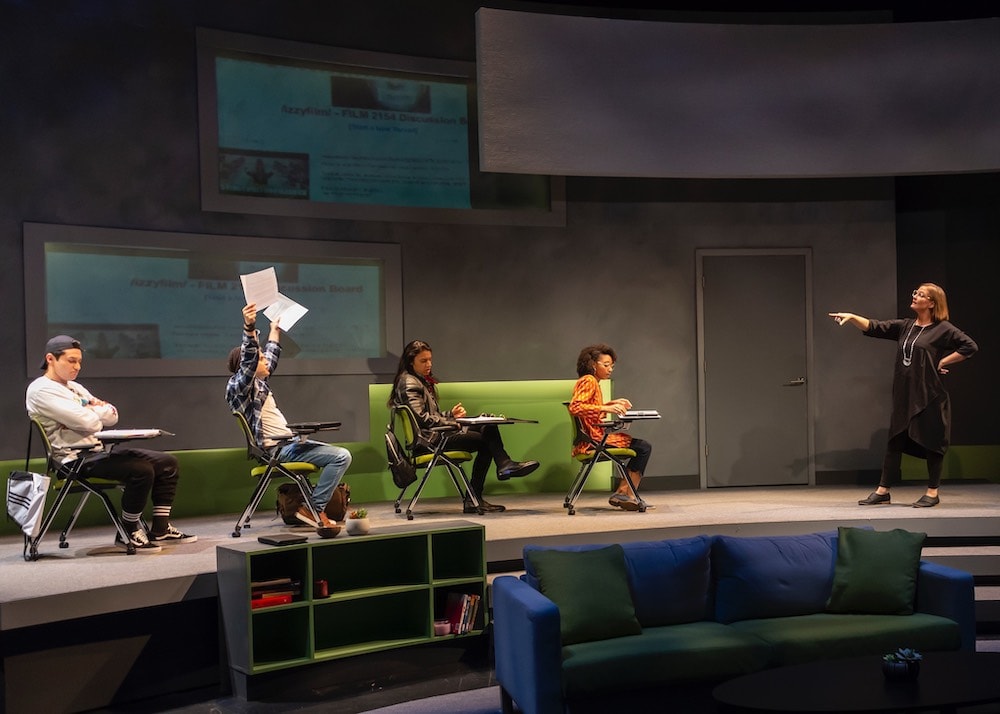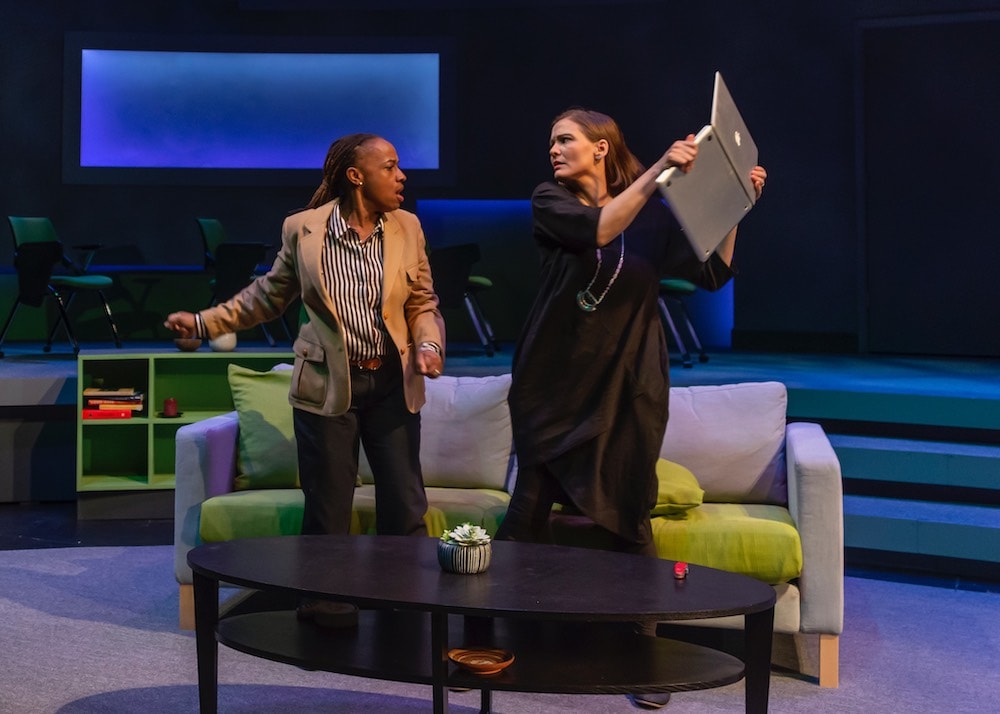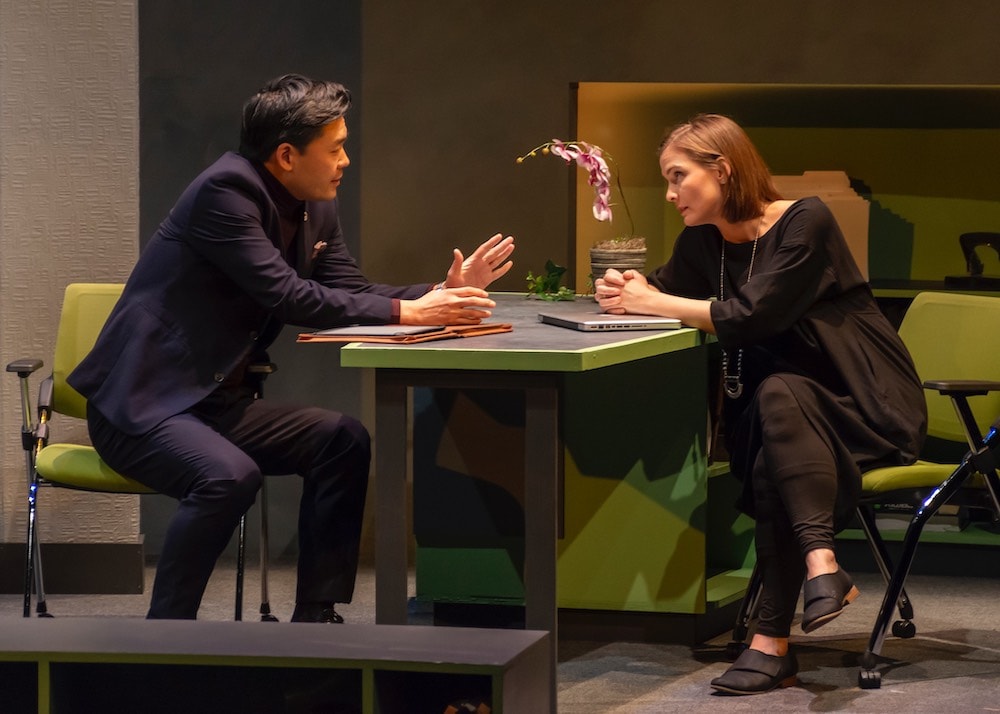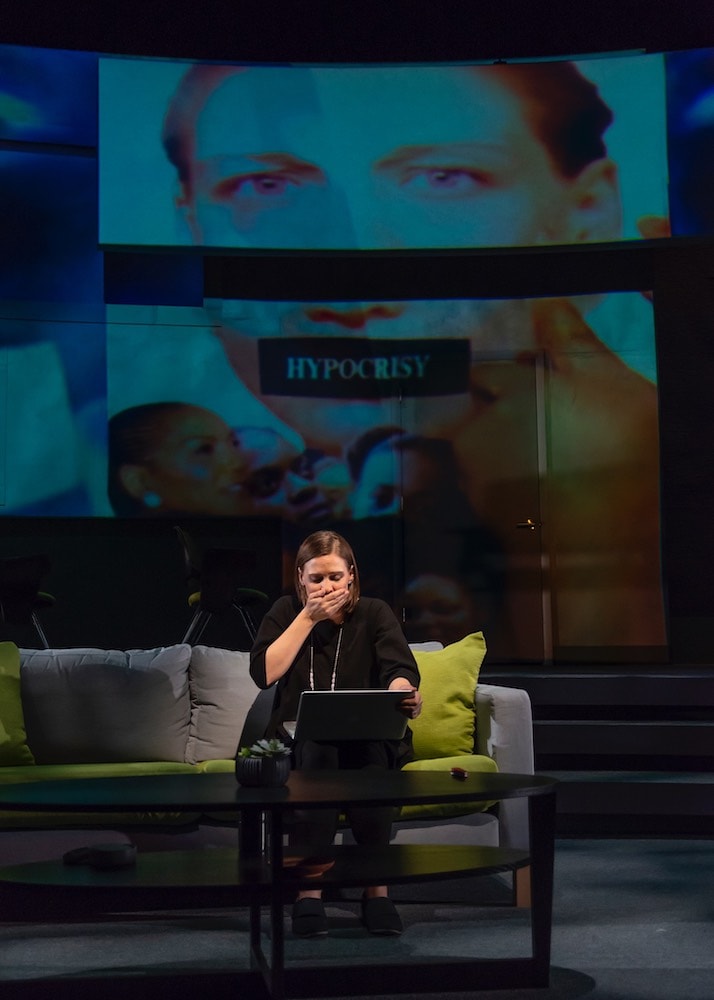Academia has inspired several thematically penetrating plays featuring female protagonists—the two teachers falsely accused of being lesbian lovers, for instance, in Lillian Hellman’s 1934 The Children’s Hour, and the passionate and hubristic title character in Jay Presson Allen’s 1966 The Prime of Miss Jean Brodie. Now comes Norman Yeung’s Theory, a trenchant intellectual thriller featuring Isabelle (Musa Gurnis), a young, white, tenure-track professor of film theory who is both married to an African American woman and passionate and hubristic.

“I’m a professor of critical thinking,” Isabelle mouths off in her office to her department head, Owen (Tony K. Nam). “Nothing is offensive to me.”
“You keep pushing your liberal agenda so hard, someone will push back!” he retorts.
“Nothing offends me,” Isabelle also asserts at home to her wife, Lee (Andrea Harris Smith)—even as they are looking at racist posts on the online discussion board that Isabelle set up for her film theory class and adamantly refuses to moderate.
“Ask me if I’m offended,” Lee claps back.

Even Isabelle’s class pushes back. “Everything’s ‘allowed’ here, guys,” she tells them of that free-for-all electronic forum.
“That’s a terrible idea,” says one of her students.
“You can’t, like, just do forcible trusting on us,” says another.
Thus early on in this brazenly brainy play, you suspect that Isabelle’s progressivism—her anything-goes-in-academic-inquiry ideological purity—is about to precipitate a fall. And sure enough, that’s what happens, in a horrific and haunting twist that I’ll leave you to be surprised by when you take in the play.
There is an intriguing similarity between Yeung’s Theory and Mosaic Theater Company’s #WokeSeason opener, Lynn Nottage’s Fabulation, or The Re-Education of Undine, which is also about a woman—a high-flying PR professional—who is brought down by her passion and pride. Fabulation is in part, as I wrote in my review, “a cautionary tale about a female striver who leaned in so far she lost her balance.” So too, Theory tells a cautionary tale about an ultra-liberal female prof whose progressivism, stretched to its limits, proves her undoing.
Theory does this by tapping into the touchy zeitgeist of contemporary academia. Anyone who hasn’t been an undergrad for the last few decades might be startled by how uptight college life has become. Students now expect and demand trigger warnings and content warnings about anything that might conceivably offend anyone, microaggress against anyone, or make anyone feel unsafe. Guest lecturers with un-PC views are routinely no-platformed. Public shaming and so-called cancel culture prevail on campus and social media.

Yeung vividly dramatizes this recent centering of student hypersensitivities in the characters of Richard (Josh Adams), Davinder (Benairen Kane), Jorge (Camilo Linares), and Safina (Tyasia Velines), who collectively become the play’s antagonist. Thus when Isabelle makes them watch the 1915 pro-KKK film Birth of a Nation and the 2000 pro-porn French film Baise-Moi, they vociferously object.
“You keep pushing your liberal agenda so hard, someone will push back!” Owen had warned her.
“You can’t force your students to join your revolution, can’t make them carpe diem the shit out of everything,” Lee had chided her.
And sure enough, some of Isabelle’s students fight back by placing anonymous hate-filled and sexually graphic posts on the discussion board that not only test how far she will let them go but also menace her and Lee’s private life. (That’s when Theory takes off as a thriller.)

Mosaic’s Associate Artistic Director Victoria Murray Baatin directs a sleekly cinematic production that stimulates the mind’s perceptual acuity like a film projected at more frames per second than it was shot in. And the payoff is in the audacious questions Theory fleshes out: How can anyone be offended by nothing? How clueless and supercilious can one be? Simultaneously Theory considers the provocative opposite: How can robust academic inquiry coexist with vigilante repression? How anti-intellectual and censorial can that get?
Playwright Yeung is anything but doctrinaire. He puts the tough paradox to us. His thumb is never on the scale. “I revel in the gray,” he has said.
Thus does Theory become an invigorating drama of critical ideas that replays in the mind the next day the way a catchy tune gets stuck in one’s head.
Running Time: One hour 35 minutes, with no intermission.
Theory plays through November 17, 2019, at Mosaic Theater Company of DC performing at the Atlas Performing Arts Center in the Lang Theater, 1333 H Street NE, Washington DC. For tickets, call the box office at 202-399-7993 extension 2, or go online.




